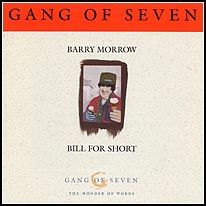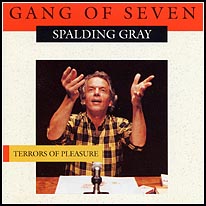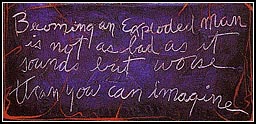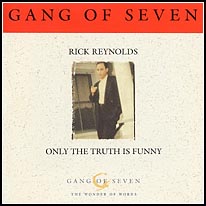Note to readers: I’ve tried to contact Mr. Ackerman for permission to post this interview, but haven’t received a response. I hope he approves. Getting this story told is worth risking a little ire.
— Mark
The Story of Gang of Seven
An interview with the label’s founder, William Ackerman
Introduction

In 1998 I posted a page of one-paragraph reviews of recordings on the Gang of Seven spoken word label. Over the years, a number of people have contacted me to ask if I knew what had happened to Gang of Seven or where to get their now out-of-print recordings. I was always sorry to tell them that they knew as much as I did.
In the spring of 2004 I received an email from William Ackerman, the founder of Gang of Seven. He was happy to discuss the label, and I was curious about its origin and history. I suggested conducting an interview via email and presenting the transcript as a Web page. Mr. Ackerman agreed, and over the course of the next two weeks sent answers to a baker’s dozen questions. The interview below isn't verbatim, but needed only minor editing.
William Ackerman on Gang of Seven
What inspired the creation of the Gang of Seven label?
As a kid of 16 or so I remember hearing the LPs of Hal Holbrook doing his one man theater presentation of Mark Twain. It was very much a monologue and I loved it. Fast forward to 1989 or so when Garrison Keillor was looking for wider distribution for his Lake Wobegon monologues and approached Windham Hill in that regard. Garrison’s handlers spent some considerable time with us learning about Windham Hill’s distribution network and the record business in general and chose to maintain their independence and handle their distribution in house... given their built in promotional capacity probably the best choice.
What was the origin of the name “Gang of Seven”?
Having sold Windham Hill (and our affiliated labels) to BMG in 1992, I was hoping to hand pick a lot of my favorite Windham Hill employees to head up a new company. BMG and I had negotiated back and forth until I was finally obliged to sign a three year “non-compete” which prevented me from moving directly into the music business. The collection of seven friends who looked forward to creating a new music company were now presented with the cold fact that music would be at least three years away. This “Gang of Seven” as we called ourselves, realized that we would have to at least delay our dreams for the new company.

I loved the name.... it was a departure from the new age vibe that, for better or worse, defined Windham Hill. I think it was a somewhat adolescent reaction on my part; I loved all that we’d done at Windham Hill, but I didn’t want to be pigeon-holed into one aspect of creativity or audience. My own tastes have always been eclectic and I guess the upstart kid wanted to move outside of the definition imposed upon me by the success of Windham Hill.
I don’t play golf and the idea of wandering around in matching clothes with a bunch of guys who I suspect wouldn’t cherish my political views didn’t seem like an option... it was then that I started thinking about my fondness for monologue. So the company I created, Gang of Seven, took its name from what might have been a new music label.
Some Gang of Seven artists, such as Spalding Gray, were well-known before the label was formed. How did you find other artists whose work wasn’t as well known (e.g., Hugh Gallagher)?

I suppose there were as many methods of learning about these people as artists on the label. Spalding Gray had the greatest visibility and we wanted him very much as the cornerstone of the label. Hugh Gallagher we found from his college entrance piece which was published in Harper’s. When we read that, it was a no-brainer to realize that he had something for everyone, but was different for us in his age and what we hoped would be his demographic. So much of this work was written as one-person plays; that was true of Kevin Kling, Nora Dunn (Saturday Night Live), Rick Reynolds, and Wally Shawn (whose The Fever we recorded but didn’t release as I moved back into music). We looked for obvious built-in promotional angles; Tom Bodett and Andrei Codrescu both were regulars on NPR and, of course, Tom had his Motel 6 identity to draw attention to his work. Lynda Barry is an author, has a comic strip and does readings on NPR. Barry Morrow is the writer of Rain Man starring Dustin Hoffman and that other guy. In short, all these people had something that would, in my estimation, give us a head start in getting some recognition for the work they were doing with us.
What problems did Gang of Seven face?
I’m still somewhat dazed by the fact that this wasn’t massively successful. I can’t tell you how many people went nuts for this stuff when they heard it... the problem was that very few people heard it. I suppose there was a measure of hubris in all of this for me. I had spent my life being almost dangerously successful and thought that success was like rolling off a log. This whole experience was a real personal learning exercise. In a strange way I simply wasn’t prepared for problems and essentially tried to solve the problems by spending more money (a very odd reaction from someone whose success had come in through the back door and guerilla tactics).
One preconception I kept hearing was “OK, so I buy this for $14.00 and I listen to it once and it’s done. Why am I spending $14.00 on something I use once? If I buy a CD of music I listen to it for years.” In the process of recording and editing these pieces I was listening to them fifty times at least and I can say in all honesty (I have nothing to gain at this point) that I enjoyed some of the programs more after the fiftieth listening. I did not see this work as disposable. Perhaps you wouldn’t listen to it every day for a month, but it would be there like a good movie to entertain (a bland and one dimensional word, but you get the point) you again and again. I don’t know why I didn’t use the movie analogy more, as I think it’s apt. Here you’re spending $30.00 on a video cassette (at the time) and you don’t see the purchase as disposable... why would you see a CD of storytelling/monologue that way? As I said, I’m still mystified and am even more so when I still encounter the 17 people who bought our CDs who tell me it was one of the most amazing artistic statements they came across in a decade.
After a while I couldn’t take the beating any longer. About that time my non-compete was over with BMG so I went back into music, which continues to be a place I work effectively and enjoyably in.
Do you have any memorable anecdotes about working with Gang of Seven artists or running the label?
I think my favorite story is associated with a track from our debut sampler project, First Words. I was crossing the U.S. with a DAT recorder and doing sort of a Gang of Seven meets Blue Highways... staying off the interstates and driving through small-town America, meeting the natural storytellers along the way. We’d been in run-down motels for a string of nights and I admit I’d tired of dinners where the wine list offered only two bottles: red and white. I needed room service and a decent bed, so we broke the rules and headed into the Peabody Hotel in Memphis. We found ourselves in the lobby with an incredible amount of activity everywhere around us. It turns out that this was the week of the opening of the Martin Luther King, Jr. Museum. It was a national media event, of course, and so we presented ourselves as press so we could get passes to all the events.
A lot of the seminars were, of course, on civil rights. One of the most gripping stories I heard in those two days came from Richard Stolley, the Editorial Director of Time magazine who, as a younger man, had been covering civil rights in the South. He told the story of the desegregation of a Southern school with the eye and ear of a brilliant writer. I was touched by the story and asked Richard if he could tell it again for me and my recorder in my room. He agreed and came up to record it. There is a moment in the story where the tension is very high and Richard knows how to use that effect.... just as he reached that moment there was an incredible blast of thunder as a lightning storm began. Rather than re-record we chose to leave that moment in... a perfect sound effect for the piece.
In Montana we ran into what we thought was a true psycho. It made no sense. The guy was mid-60s and wearing oil stained overalls. His wife was this drop dead gorgeous blonde from Sweden. He began telling stories of having to fly out to Washington D.C. to offer advice to various presidents and of having to come out of retirement every now and again when the Air Force couldn’t figure out how to fly one of their new jets. He was upset by the recent fire that had burned so much of Yellowstone National Park and said that he’d had to fly Ross Perot up to look at the damage. The whole thing was just outrageous. I later learned that everything he told me was true, confirmed by a number of inside sources. An incredible afternoon. I still have the tapes and may do something with them some day. I haven’t lost my love for this form of art and entertainment and may try again when life slows down a bit.
Which releases were you especially proud of?

I toured with Tom Bodett when he was doing Exploded. He would begin the program by throwing a handful of 3×5 cards (the “chapters” of his story) into the air and then asking the audience to tell him which card to pick up next. It created a different dynamic every night and kept Tom in the experience. I loved this piece and still do. I think Rick Reynolds’ Only the Truth is Funny is one of the most incredible pieces I’ve ever heard in my life... a perfect balance of humor and tragedy. I listened to this while crossing country this March and loved it more than ever. My favorite program was unquestionably Bill For Short by Barry Morrow. There was no flash to this, no tricks... it was just heartfelt storytelling. This piece touched me more than anything else we did.
From the point of view of the average consumer, Gang of Seven releases quietly disappeared their from local stores. What happened?
What happened is that I spent about two million dollars and sold a few thousand copies of Gang of Seven CDs and cassettes. It had to stop. It was really a shock to me. I felt that I had been wise to court both the record and book business. I felt I had been wise from a tactical point of view in picking artists who had their own built-in promotional engines. Most importantly I felt I had picked some very talented people to work with who were doing very good to phenomenal work. I invested in the venture generously (too generously according to my accountant!), but it just didn’t fly. I say this in all honestly.... if someone sees an angle that I missed, I’d love to know about it as I remain completely enamored of the art form and may wish to dabble in it again.
Do you feel that you accomplished your goal with the label?

Not on any level except artistic. I didn’t have enough success to continue doing it even on a modest level. I didn’t (as was the case with Windham Hill) provide a home for a genre of artistry that would effectively support a group of artists who make it. I didn’t manage to get the widespread press attention that something literate, if not literary, should have deserved (despite a small mention in Time).
The experience remains the great mystery of my life. One of the lessons I thought I had learned at Windham Hill was that something sincerely done will find a home somewhere in the American (and world) marketplace. While I wish to continue believing this tenet, my faith in it was certainly undermined by the Gang of Seven experience.
How many releases were there total?
Fourteen, I think, with four projects in the can: the Gang of Seven Road Trip I discussed earlier, Wally Shawn’s The Fever, a very powerful piece on AIDS including interviews with all of the major medical and research people involved in the understanding of the disease internationally, and another installment of the First Words sampler.
Who now owns the rights to Gang of Seven releases?
Audio Literature in San Bruno, California re-released the material. [For contact information, see below - mli]
Do you think story-driven radio shows such as This American Life and The Next Big Thing are following in Gang of Seven’s footsteps?
We actually talked to Ira Glass [host of This American Life] about doing some work for Gang of Seven. This was just about the time that he was getting his program off the ground and there were legal issues that we couldn’t get around, given his association with NPR. Ira and Lynda Barry were close and so he felt like part of the family. I don’t feel we invented even a small corner of spoken word, but were there to document it and put it together in a cohesive label. I think it’s sad, far beyond the financial issues, that we didn’t manage to make this a part of the choices available to people....that this didn’t get into the American psyche sufficiently to provide the sort of haven for spoken word and its fans.
Is there are larger audience for spoken word recordings today, thanks to story-driven radio shows and the rise of audio books?
I think if there were, there would be a Gang of Seven-like label riding the crest of the wave. I remain convinced that there is an active audience for this work and that for intelligent content there would be a loyal audience. I suspect that the nature of dissemination would be different today with the Internet companies like Sirius. As I write this I feel that, in all my spare time (not!) I should try these mediums.
I’d like to express my appreciation and thanks to Mr. Ackerman for consenting to this interview, and for giving us a chance to hear so many unique stories.
Finding Gang of Seven releases
Here’s the contact information for Audio Literature:
Audio Literature
Contact: Lisa Hunt
800-383-0174 : 650-583-9700 (CA) : Fax 650-583-0235
audiolit@aol.com
370 West San Bruno Ave., Ste. F, San Bruno, CA 94066
In mid-2004 I tried contacting them by phone and email, and never received a reply.
Some recordings are being offered by the original artists, such as Lynda Barry’s The Lynda Barry Experience, and Kevin Kling’s Home and Away.
Last updated 5 October 2005
http://www.rdrop.com/~half/Personal/Hobbies/MusicReviews/Gang.of.Seven.interview.html
This interview ©2004 William Ackerman except images ©1992 Gang of Seven